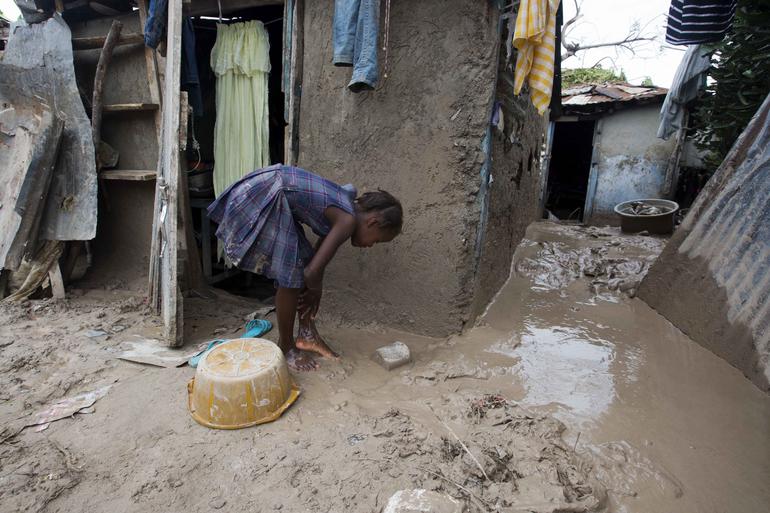A mother and her six-year-old daughter had abandoned their flimsy home in the Cavaillon area on Tuesday and were heading to a nearby church when they were killed.
The town's mayor, Ernst Ais, said: "On the way to the church, the wind took them."
The death toll in Haiti has risen to around 340, however, the figure is expected to rise as rescue teams continue to search remote areas initially left cut off by the storm.
Pilus Enor, mayor of the Haitian town of Camp Perrin said: "Devastation is everywhere. Every house has lost its roof. All the plantations have been destroyed. This is the first time we see something like this."
Hurricane Matthew, the first Category 4 storm to strike Haiti in more than half a century, was buffeting coastal Florida on Friday with 120 mile per hour winds, despite being downgraded to Category 3.
The south west of Haiti bore the brunt of Hurricane Matthew and it is thought most of the fatalities occured in the department of Grand-Anse and surrounding areas.
Gusts reached 145 miles per hour in Haiti earlier this week, smashing concrete walls, toppling trees, ripping off roofs and forcing thousands of people to flee homes.
Amid concerns crops have been destroyed, wells inundated by sea water and some water treatment centres ruined, Haiti's government believes at least 350,000 people require some kind of help.
The International Red Cross and Unicef have each launched multi-million pound appeals for aid, while the Pan American Health Organisation is warning of a surge in Cholera in Haiti.
Hurricane Matthew has since affected some parts of Cuba and the Bahamas. However, levels of damage do not appear to rival the extent witnessed in Haiti.
Before hiting Haiti, Hurricane Matthew was said to have caused four deaths in the Dominican Republic, one in Colombia and one in St Vincent and the Grenadines.
Carwyn Hill from Christian charity Hope Health Action in Haiti told Premier the country needs help.
He said: "They had flooding which destroyed about 60 per cent of the country's harvest, then they had the earthquake killing over 320,000 people, the cholera epidemic.
"It really has been a rough six or seven years and obviously now our prayers and support through getting behind the people is really critical".
He said that the government is not able to deal with the aftermath: "The government's capacity to actually respond effectively is hampered - they are going to have a lack of hospital clinic facilities, they don't have the emergency services to deal with this kind of situation so I think their call to the international community to really get behind them is one that we really need to take seriously".
Carwyn Hill told Premier what he will be doing to help: "We'll be focusing our energies on the cholera epidemic because of the wide-scale flooding and the poor sanitation that will come as a result of the hurricane. There's real fear around that and the frustrating thing with cholera is that if you can't get someone to a treatment centre quickly, the results can be devastating".
Listen to Premier's Alex Williams speak to Carwyn Hill here:




